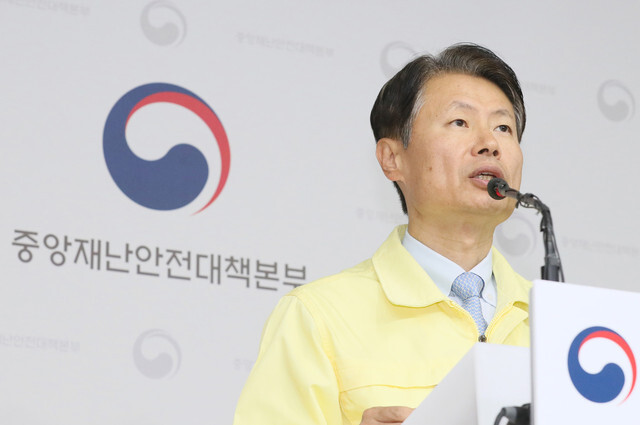hankyoreh
Links to other country sites 다른 나라 사이트 링크
S. Korean health authorities warn it’s too early to relax social distancing, even if spring semester starts

With South Korea’s spring semester scheduled to begin online for some schools on Mar. 9, experts are warning that a relaxation of social distancing could lead to more cases of COVID-19. Despite the tough social distancing rules that have been in place for the past two weeks, since Mar. 22, the country continues to see around 100 new cases every day.
The public health authorities reported 125 new cases of COVID-19 on Mar. 31 and 101 on Apr. 1, bringing the cumulative total of cases to 9,887. On Mar. 31, 180 patients were released from quarantine, while 159 were released the following day; a total of 5,567 people have recovered from the disease so far, while 4,155 remain in quarantine, down 61 from the previous day.
“While the entire government is striving to reduce the occurrence of patients, we haven’t seen clear signs that the rate is decreasing. There are serious concerns that easing up on [social distancing] could cause the disease to start spreading again,” said Kim Gang-lip, first general coordinator for the Central Disaster and Safety Countermeasures Headquarters and vice minister of health and welfare, during the daily briefing on Tuesday.
The daily average of new cases over the past week (Mar. 25-31) was 107, which was actually a little higher than the previous week (Mar. 18-24), when the average was 102. The disease continues to spread because of infected individuals arriving from overseas and small clusters of transmission at churches and nursing homes.
As a result, South Korea’s disaster safety headquarters doesn’t think it’s feasible to immediately make the transition to more routine quarantine measures to match the beginning of the spring semester. “I can’t tell you that [the transition to routine quarantine] will take place on Apr. 9 [when the semester begins], since that question is still being discussed inside the government. We need time to draw up specific guidelines for each area of everyday life, including individual workplaces, and to help people understand and implement those guidelines,” Kim said.
“If we delay preparations to adequately prevent community-based transmission [of COVID-19] by carrying out strict social distancing measures, it might also push back the timing of switching to quarantine measures that are more compatible with our everyday routines,” the official added.
While the educational authorities have said they’re working on a plan to simultaneously carry out online classes and in-person classes as early as the end of April, some experts are calling for caution. “Under these circumstances, I don’t think that even the end of April would be feasible. Even if we hold in-person classes, we’ll have to take preliminary measures to reduce the risk [of infection] within the classroom. I hope that such measures aren’t taken as a signal that it’s ok for people to have social gatherings,” said Choi Won-suk, professor of infectious disease at Korea University Ansan Hospital.
“Rather than talking about a two-week time limit, the government needs to let us know that [COVID-19] isn’t going to end soon and to come up with a compromise by which we can maintain some degree of economic activity while putting up with inconveniences in the mid- and long-term,” said Kim Woo-joo, a professor of infectious disease at Korea University Guro Hospital.
By Park Da-hae and Seong Yeon-cheol, staff reporters
Please direct comments or questions to [english@hani.co.kr]
Editorial・opinion
![[Column] Life on our Trisolaris [Column] Life on our Trisolaris](https://flexible.img.hani.co.kr/flexible/normal/500/300/imgdb/original/2024/0505/4817148682278544.jpg) [Column] Life on our Trisolaris
[Column] Life on our Trisolaris![[Editorial] Penalties for airing allegations against Korea’s first lady endanger free press [Editorial] Penalties for airing allegations against Korea’s first lady endanger free press](https://flexible.img.hani.co.kr/flexible/normal/500/300/imgdb/original/2024/0502/1817146398095106.jpg) [Editorial] Penalties for airing allegations against Korea’s first lady endanger free press
[Editorial] Penalties for airing allegations against Korea’s first lady endanger free press- [Editorial] Yoon must halt procurement of SM-3 interceptor missiles
- [Guest essay] Maybe Korea’s rapid population decline is an opportunity, not a crisis
- [Column] Can Yoon steer diplomacy with Russia, China back on track?
- [Column] Season 2 of special prosecutor probe may be coming to Korea soon
- [Column] Park Geun-hye déjà vu in Yoon Suk-yeol
- [Editorial] New weight of N. Korea’s nuclear threats makes dialogue all the more urgent
- [Guest essay] The real reason Korea’s new right wants to dub Rhee a founding father
- [Column] ‘Choson’: Is it time we start referring to N. Korea in its own terms?
Most viewed articles
- 1New sex-ed guidelines forbid teaching about homosexuality
- 260% of young Koreans see no need to have kids after marriage
- 3[Column] Life on our Trisolaris
- 4OECD upgrades Korea’s growth forecast from 2.2% to 2.6%
- 5Presidential office warns of veto in response to opposition passing special counsel probe act
- 6Months and months of overdue wages are pushing migrant workers in Korea into debt
- 7[Guest essay] Maybe Korea’s rapid population decline is an opportunity, not a crisis
- 8Trump asks why US would defend Korea, hints at hiking Seoul’s defense cost burden
- 9[Editorial] Penalties for airing allegations against Korea’s first lady endanger free press
- 10Japan says it’s not pressuring Naver to sell Line, but Korean insiders say otherwise